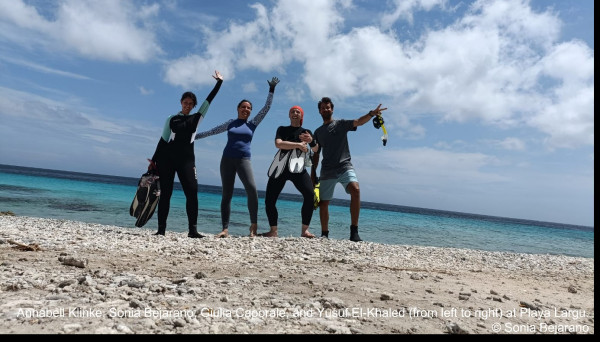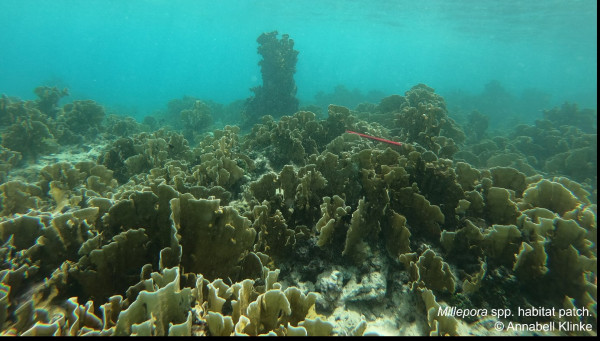Dushi Time on Curaçao, Caribbean | May 2022 – July 2022
Curacao - the heart of the Netherlands Antilles - is where we had the chance to live and work for two months after battling with several lockdowns and uncertainties in the time of COVID-19. It was exciting to finally conduct fieldwork again in such a beautiful place where the islanders are so generous and kind. It is a place where time works so differently, and you feel more at peace. It is a place that at least I will not forget, but let’s start at the beginning.
Annabell Klinke, Sonia Bejarano, Guilia Caporale, and Yusuf El-Khaled (AG Riffsysteme), Playa Largu | Photo: Sonia Bejarano
Curaçao is a small island located about 60 km north of Venezuela in the Caribbean, only 61 km long and varies in width between 5 and 14 km. Curaçao belongs to the ABC islands with Aruba and Bonaire, which are also referred to as the Leeward Islands (“Inseln unter dem Wind”) because cyclones causing severe devastation in other areas of the Caribbean rarely reach these islands. The climate is warm and water temperatures reach at least 25 °C, making it very easy to just jump straight into the water (auch für die gößten Frostbeulen unter uns ????). While we can find coral reefs almost all around the island, it’s the fossil reefs that led us there.
In the project “Frozen in Time” we wanted to investigate the very well-preserved Pleistocene reefs on Curaçao. Fossil coral reefs, that were living in past warm periods, can provide several insights on former climates. In turn, these can be used to gauge the sensitivity of different components of the Earth's system to future climate changes. In this way, we will contribute to enhance our knowledge on if, how, and why fossil reefs are different from their modern counterparts on Curaçao.
Two months on an island gives you a lot of time to collect tons of data that is now waiting to be analyzed back home here in Germany:
- First, we explored several modern and fossil reef sites. We captured these sites in hundreds of images that will now be used to create detailed orthophotomosaics and digital elevation models (DEMs). These underwater and on-land virtual outcrops will then be used to compare the taxonomic community structure and the distribution of coral traits between modern and fossil reefs.
- Second, we planned and ran an 24 h experiment on a secluded beach to gain insights into diurnal variations of physical, chemical, and ecological parameters that may be shaping this modern reef nowadays, so that we could later compare it to its fossil counterpart. This experiment ended up being one of my fondest memories of Curaçao. Doing exciting fieldwork, enjoying the company of great colleagues, sitting around a campfire, and sleeping under the stars - sounds like a dream? Definitely, but you need a high tolerance towards mosquitoes.
- Last but not least, we collected data on habitat patches dominated by either branching Acropora palmata or firecorals Millepora to compare their efficiency in attenuating wave energy and capturing sediments. We will create 3D models of these habitat patches to compare structural complexity indices (e.g., surface complexity, elevation, slope, and rugosity) and analyse remote underwater videos on fish biodiversity, abundance, and habitat use.
By the end of the fieldtrip, we managed to collect all the data that we wanted or needed, and even more. We built connections to other researchers from diverse fields that may open new doors for future collaborations. New research ideas were already born by just looking and wondering about our surroundings, bringing us back to the main reason why most of us probably became scientist in the first place – an everlasting curiosity about the world that we live in.
Someone may think now “Wow, that sounds almost too perfect!”. And obviously this person would be right. Every scientist knows that fieldwork or even an experiment never goes as initially planned. It drives you to become creative, work in a team, and to be flexible and resilient. And then there are of course events that are out of your control, e.g., a colleague getting food poising, getting stuck with your 4-wheel drive transporter, or to sit out a tropical storm warning. Nevertheless, this is all part of the adventure!
For those of you that will head off soon to their fieldtrip adventure, three lessons that I learned during my time on Curaçao:
- You always need more time to conduct your research than you think.
- Cable ties are your best friend.
- A good team is the secret to success.
To sum up, our time on Curaçao was successful and I cannot wait to share our results with you all! And if you ever will have the chance to visit Curaçao yourself, I promise you that you will have a dushi time (Papiamento word for: indicating a great sensation, sweetheart, or yummy).
Cheers,
Annabell Klinke






















